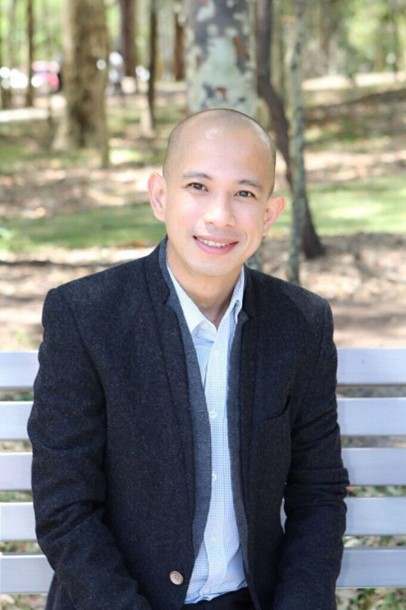Championing Disability-Inclusive Employment

Sherlo Reyes believes that providing employment opportunities to deaf graduates is not enough; creating an atmosphere that welcomes them in the workplace also matters.
"Many companies are not really aware of how they welcome the deaf. There is hesitation and they simply don't know what to do. There is really a need for awareness," said Sherlo.
Sherlo, who worked as the employment opportunity coordinator for deaf students at the De La Salle–College of St. Benilde (DLS–CSB), has been exposed to the challenges of those who are hard of hearing in the workforce. Through his work, Sherlo helps introduce prospective employers to deaf students.
Recognising the need to create awareness about inclusive hiring practices, Sherlo pursued a re-entry action plan (REAP) for Australia Awards Scholarships that will make workplace inclusion integral to organisational culture.
Beyond disability support
Through Australia Awards, Sherlo took up a Master on Human Resource Management at the University of Newcastle. According to Sherlo, his Australian education provided new perspectives regarding hiring and workplace practices within organisations
"In Australia, I took up a Cultural Diversity and Management course, which allowed me to develop a better understanding of diversity and how it affects organisations," said Sherlo. "My Australian education helped develop my frameworks. Instead of just disability support, we need to talk about access."
Aside from earning his master's degree, Sherlo also experienced firsthand the Australian way of working, which does not discriminate based on status. Inspired by one of his courses, he applied for short-term work as a maintenance crew to experience what it was like to be part of what many consider to be the "invisible workforce."
"In my Human Resource Management Course, during my first term of studying in Australia, we discussed 'invisible employees' – those who are often ignored and are from different ranks or classifications. I was moved by our discussions because during my years of working in various companies, I didn't pay much attention to the politics and conditions of the employees," he shared.
The experience, according to Sherlo, gave him a glimpse of the differences and similarities of working in Australia and the Philippines.
"The dignity of work is very evident [in Australia], regardless of your work. I envy that. Why is it different in the Philippines?" said Sherlo. "With my realisations, I now make time make time to talk to our 'invisible workers' and know their struggles."
Sherlo's work experience also prompted him to enroll in Cross Cultural Management as an elective, which further deepened his appreciation and commitment to workplace diversity and inclusion.
Form inclusive hiring to workplace inclusion
Upon his return to the Philippines, Sherlo implemented his REAP, which is a training program comprised of four modules designed for the partner companies of DLS-CSB's School of Deaf and Applied Studies. As part of the program, he recalibrated Michalle Mor Barak's "Perception of Inclusion-Exclusion and Diversity Scale" assessment tools for the Philippine context by integrating questions that took into account Filipino work culture and norms.
"These modifications were anchored on the learnings from my studies, my work experiences both in the Philippines and Australia, as well as observations gathered from years of experience in placing deaf talents in various industries."
Sherlo's REAP has since been used by the National Economic and Development Authority (NEDA) Regional Office IX; Trias Southeast Asia, an international NGO; and private corporations including Towers Watson, HP, Ernst and Young, and Makati Shangri-La.
Nick Vanden Broucke of Trias underscored the value of Sherlo's program: "Trias Southeast Asia was blessed to have worked with Sherlo Reyes. He conducted a thorough assessment that helped our team analyze factors that contribute to our organisation's performance with regards to inclusion, diversity, equity, and accessibility. He also provided us with a very strong and valuable final report with recommendations on how our team environment could be transformed into one that is more inclusive and equitable."
Meanwhile, Karyl Kristal M. Villejo, OIC-Chief of the Finance and Administrative Division in NEDA Regional Office IX, shared that Sherlo's program helped their office become more inclusive. "The program prompted me to discern policy implications and inspired me to be more mindful when designing initiatives that can help enhance the current work environment and systems while meeting the needs of diverse clients."
Working with new partners
Sherlo is currently the Director of the Center for Partnership and Development of DLS–CSB's School of Deaf Education and Applied Studies. Looking ahead, he is developing accessibility and audit standards for employers and for partner companies.
"We hope to work with new partners to expand where my REAP can be used. We want to have one-stop shops all over the Philippines where deaf talents can find employment and support for their careers."
Empowered by his Australian education and experience, Sherlo is more passionate than ever to do his part in forging a more inclusive society. He is not just providing Filipino deaf talents with access to the job market, he is making a difference in their lives while changing the narrative in Philippine workplace culture.



